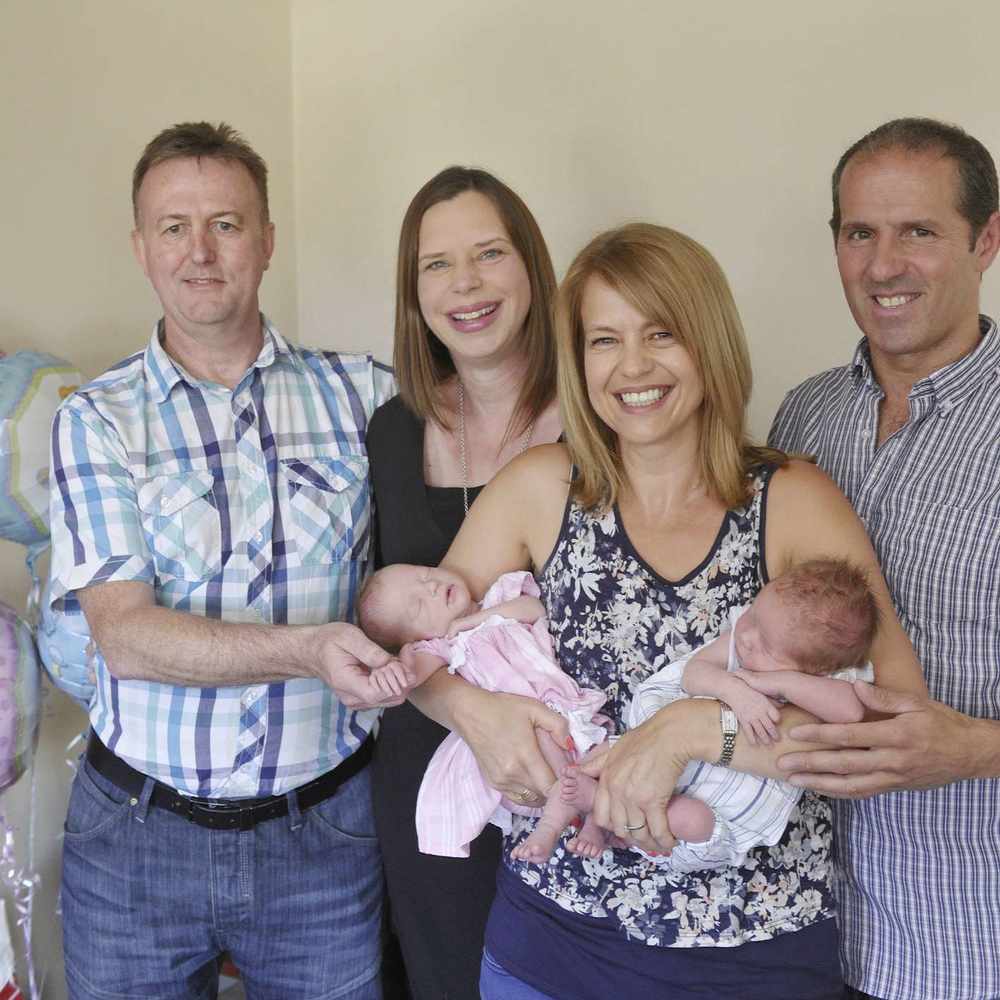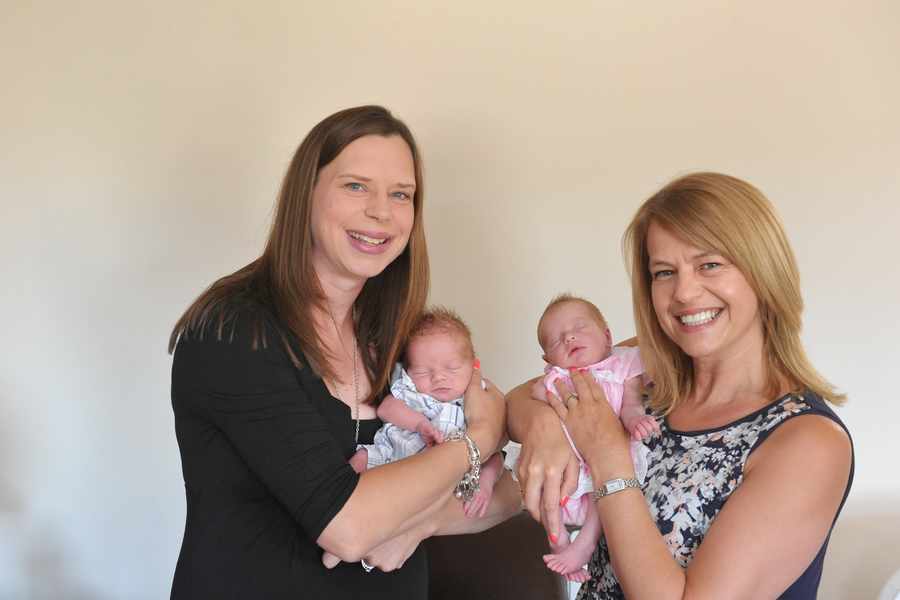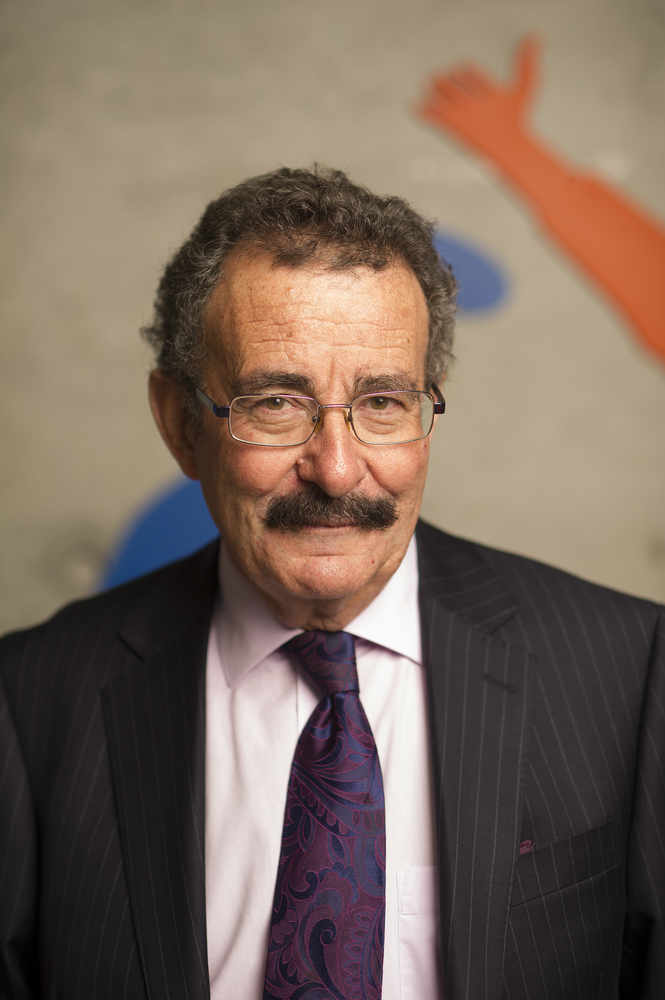The twins made the headlines last year after Islander Karina Ward acted as a surrogate for best friend Sue French in what is believed to be the first surrogate birth in Jersey.
And 15 months on from their arrival on 20 June at the General Hospital, the twins have returned for a visit from their Carlisle home.
Sue said: ‘They are like little celebrities. This is their first proper visit since they were tiny and everyone says you must bring them round. Everyone wants to see them.’
Karina, a medical staffing officer for the Health Department, acted as surrogate after Sue struggled with infertility for 17 years. Two eggs were implanted into her womb at the London Women’s Clinic on 17 October, but for the rest of her care she was seen by medics in Jersey.
Sue said: ‘Not one day goes by when I don’t thank my lucky stars and Karina. She is in my mind every day. I can’t imagine them not being here.

‘Being a mum is just mind-blowing. The love you feel for them and the frustration they can give you as well – it’s overwhelming at times but in a good way. Karina is amazing. I keep thinking, what if I had never met her?’
Sue’s partner, Paul Cecchini, added: ‘It’s been a journey. Like any new parent it has been made up of massive highs and lows and lots of sleep deprivation, but seeing them grow on a daily basis is amazing.’
However, Karina, who met Sue when they worked together in the UK, is adamant that what she did was ‘no big deal’.
The mother to Jayden (5) and Kayla (3) said: ‘It’s just something I knew I could do.
‘I would do every bit of it all over again. They are so worth it. Seeing Sue and Paul being the parents I always knew they would be makes everything worthwhile.’
In the eyes of the law, the twins were not officially Sue’s and Paul’s until a Parental Order was issued, and to begin with their names were not on their children’s birth certificates. However, in February both couples successfully applied to a UK court for the order.

Sue said: ‘When I saw the birth certificates it was incredible. It was the final piece in the jigsaw for me to see my name as a mum. It made it all so real.’
Karina said that her husband, Tim, who works for Albert Bartlett, had been ‘amazing and supportive’ after she suffered from post natal depression following the births.
‘I think it was the fact I had been pregnant and my body could not understand where these babies were,’ she said. ‘It was a bit of an argument between my head and my heart. My head knew they were not mine.
‘The surrogacy clinics themselves were very focused with how you would feel when you hand over the baby. I have always known I would be able to do that. That part for me was the easiest – it was what we were aiming for. They were never mine.
‘The fact I ended with post natal depression, I was never expecting that. I feel any clinic dealing with surrogacy should be in a position to warn people.’
Karina, who lives in St Brelade, said: ‘I hope that everything we’ve been through and how everything has worked out will encourage other people to do the same. There are so many childless couples out there. Surrogacy, fostering and adoption make people’s lives complete.’

A TECHNIQUE that would see IVF babies born with DNA from three different people is ‘not unlike’ a blood transfusion, according to Professor Robert Winston.
The renowned scientist and broadcaster said the technique was compatible with his beliefs as an Orthodox Jew.
The treatments seek to replace defective mitochondrial DNA (mDNA) in a birth mother’s egg with healthy mDNA from another woman in order to limit hereditary mitochondrial diseases, and new research has suggested it could potentially help almost 2,500 women of reproductive age in the UK.
But it has sparked controversy, with the Church of England stating it did not feel a change in the law would be ‘responsible’.
Lord Winston, writing in the Daily Telegraph, said: ‘Transfusing mitochondria is not unlike transfusing red blood cells in a case of severe anaemia – the main difference being that the mitochondrial treatments last into future generations.
‘As an Orthodox Jew, my religious tradition sees no objection to using science in this way. If mitochondrial treatments could prevent disease, this is to be celebrated as we are using the God-given intelligence afforded us.
‘We are not altering a child’s characteristics, nor enhancing humans in any way. The scientists are merely trying to ensure that a crippling and sometimes fatal disease is prevented and that future generations will not suffer this horrific sadness.’
He added the widely-used three-parent child term was ‘nonsense’ and used to cause controversy over the technique.






